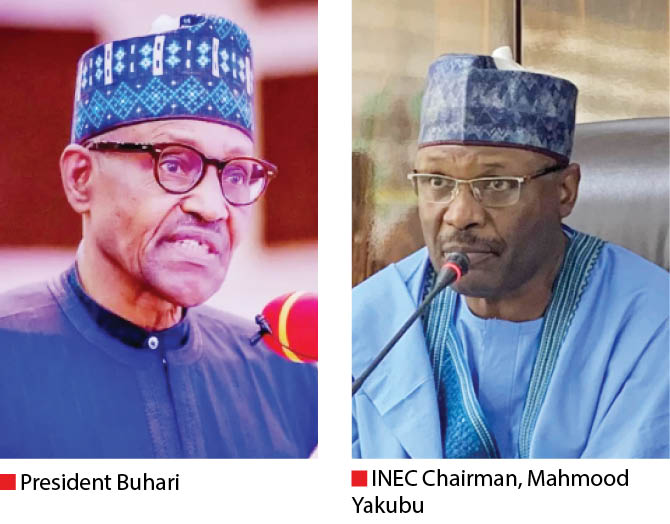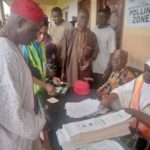Over 87 million voters from different parts of Nigeria are expected to troop out today to elect a new president in what promises to be a historic election and one of the most keenly contested polls in the country’s history.
Though Nigerians will also be voting for a new set of 469 federal lawmakers to represent them at the Senate and House of Representatives, there is renewed focus on the presidential candidates and their possible paths to victory.
While 18 candidates are in the race, only four are touted to be in the poll position to clinch the highest office. They are Bola Ahmed Tinubu of the All Progressives Congress (APC), Atiku Abubakar of the Peoples Democratic Party (PDP), Peter Obi of Labour Party and Rabiu Musa Kwankwaso of New Nigeria Peoples Party (NNPP).
In light of the intriguing dynamics of today’s elections – seventh since Nigeria’s return to democracy in 1999—millions of Nigerians are keen on knowing how President Buhari’s successor will emerge.
Return to civilian rule yet to yield expected results – Old-time voters
Return to civilian rule yet to yield expected results – Old-time voters
In this regard, the Centre for Democracy and Development (CDD), through its Election Analysis Centre (EAC), has outlined five key issues that would influence the voting pattern and outcome of the polls.
According to the pre-election brief signed by the EAC chair, Professor Adele Jinadu, and CDD director, Idayat Hassan, the five issues, dubbed the ‘five i’s, are identity, insecurity, institutions, information disorder and intra- and inter-party squabbles.
CDD is deploying 4,993 trained and accredited observers, data clerks and fact-checkers and social media monitors for the presidential and National Assembly elections as well as the March 11 governorship and state assembly elections.
It noted that while Nigerians embraced multiple identities, the electioneering and political conversations tended to sharpen divisions along those lines.
“Despite many Nigerians holding a multitude of identities the overarching reliance on ethnicity, religion and regionalism by political parties have historically accounted for electoral violence and attendant insecurity….Candidates are expected to perform better than their opponents in their ‘home’ geo-political zones, while opposition party members may face repression from state and non-state actors in these areas,” CDD noted.
The next factor that could impact the conduct and outcome of the elections is insecurity across the six geopolitical zones of the country which has led to the deployment of the Nigerian military across the federation.
“Northern states are engulfed in long-standing violence with extremist jihadist groups, criminal bandit gangs, and other non-state armed groups who are engaged in deadly attacks against local communities.
“In the south, civil unrest continues against the backdrop of ongoing violence between farmers and herders and secessionist agitators. The situation is further complicated by fuel and currency scarcity which is increasing economic hardships for the more than 130 million Nigerians classified as multi-dimensionally poor,” CDD noted.
The roles of institutions are also crucial to the conduct of credible and transparent elections. These include INEC and the security agencies faced with the herculean tasks of managing logistics and securing the electoral terrain.
CDD submitted that the success of any electoral process is dependent on the credibility, transparency and efficiency of the stakeholders that manage, regulate and secure the process.
The fourth factor is information disorder. While social media has opened avenues for citizens to engage more robustly with their prospective representatives, the volume of misinformation and disinformation circulating online can influence citizens’ actions based on incorrect information, CDD observed.
“Trust is a scarce commodity in Nigeria and this fact is only being exacerbated by the volume of misleading content online. Ahead of the polls, renewed sophistication and organisation in the push of disinformation has been observed with efforts generally focused on glorifying or delegitimising political aspirants and undermining the credibility of INEC.
“This type of disinformation has the potential to foster insecurity, dampen citizens’ trust in the electoral process and even incite violence post-election,” it added.
Finally, inter and intra-party squabbles can also impact the elections, CDD stated, noting that in the months leading up to the general elections, violent events involving political parties increased as contestation intensified within and between groups vying for power, despite all parties signing the national peace accord.
“In the last quarter of 2022, violence targeting political parties reached its highest point since the previous general elections in early 2019. In total, there have been 60 attacks recorded on political rallies, resulting in nine fatalities since the start of campaigning on 28 September,” CDD added.
Ensuring credible elections
To enhance the credibility of the 2023 elections, CDD-EAC has urged the key stakeholders to take some crucial steps.
It advised the government to ensure INEC and the security agencies have the necessary resources at their disposal to roll out comprehensive plans for the election day operations. This, the body said, would ensure polls take place in a safe, free and fair environment.
CDD also enjoined political parties to ensure that their members and supporters adhere to the conditions laid out in the national peace accord throughout the voting process and after the announcement of results.
It further advised that INEC should continue to communicate regularly with Nigerians about the ongoing election process and, be as transparent as possible, during the collation and announcement of results.
“The Inter-Agency Consultative Committee on Election Security must ensure that all security personnel on electoral duty adhere to the agreed code of conduct and rules of engagement.
“Social media companies should support the work of fact-checking organisations by promptly taking down digital content that promotes political disinformation or hate speech that relates to the election.
“Nigerian voters, and citizens in the diaspora, should critically assess information that they receive about the elections before sharing to help prevent the spread of malicious information about the elections,” CDD added.

 Join Daily Trust WhatsApp Community For Quick Access To News and Happenings Around You.
Join Daily Trust WhatsApp Community For Quick Access To News and Happenings Around You.

